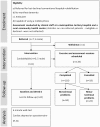Development and feasibility of a smartphone, ECG and GPS based system for remotely monitoring exercise in cardiac rehabilitation
- PMID: 21347403
- PMCID: PMC3036581
- DOI: 10.1371/journal.pone.0014669
Development and feasibility of a smartphone, ECG and GPS based system for remotely monitoring exercise in cardiac rehabilitation
Abstract
Background: Despite its efficacy and cost-effectiveness, exercise-based cardiac rehabilitation is undertaken by less than one-third of clinically eligible cardiac patients in every country for which data is available. Reasons for non-participation include the unavailability of hospital-based rehabilitation programs, or excessive travel time and distance. For this reason, there have been calls for the development of more flexible alternatives.
Methodology and principal findings: We developed a system to enable walking-based cardiac rehabilitation in which the patient's single-lead ECG, heart rate, GPS-based speed and location are transmitted by a programmed smartphone to a secure server for real-time monitoring by a qualified exercise scientist. The feasibility of this approach was evaluated in 134 remotely-monitored exercise assessment and exercise sessions in cardiac patients unable to undertake hospital-based rehabilitation. Completion rates, rates of technical problems, detection of ECG changes, pre- and post-intervention six minute walk test (6 MWT), cardiac depression and Quality of Life (QOL) were key measures. The system was rated as easy and quick to use. It allowed participants to complete six weeks of exercise-based rehabilitation near their homes, worksites, or when travelling. The majority of sessions were completed without any technical problems, although periodic signal loss in areas of poor coverage was an occasional limitation. Several exercise and post-exercise ECG changes were detected. Participants showed improvements comparable to those reported for hospital-based programs, walking significantly further on the post-intervention 6 MWT, 637 m (95% CI: 565-726), than on the pre-test, 524 m (95% CI: 420-655), and reporting significantly reduced levels of cardiac depression and significantly improved physical health-related QOL.
Conclusions and significance: The system provided a feasible and very flexible alternative form of supervised cardiac rehabilitation for those unable to access hospital-based programs, with the potential to address a well-recognised deficiency in health care provision in many countries. Future research should assess its longer-term efficacy, cost-effectiveness and safety in larger samples representing the spectrum of cardiac morbidity and severity.
Conflict of interest statement
Figures
Similar articles
-
Erratum.Mult Scler. 2016 Oct;22(12):NP9-NP11. doi: 10.1177/1352458515585718. Epub 2015 Jun 3. Mult Scler. 2016. PMID: 26041800
-
Transtelephonic electrocardiographic monitoring of cardiac rehabilitation exercise sessions in coronary artery disease.Am J Cardiol. 1991 May 1;67(11):962-4. doi: 10.1016/0002-9149(91)90168-k. Am J Cardiol. 1991. PMID: 2018015
-
Effects of home-based cardiac exercise rehabilitation with remote electrocardiogram monitoring in patients with chronic heart failure: a study protocol for a randomised controlled trial.BMJ Open. 2019 Mar 5;9(3):e023923. doi: 10.1136/bmjopen-2018-023923. BMJ Open. 2019. PMID: 30842109 Free PMC article.
-
Exercise-based cardiac rehabilitation for adult patients with an implantable cardioverter defibrillator.Cochrane Database Syst Rev. 2019 Feb 12;2(2):CD011828. doi: 10.1002/14651858.CD011828.pub2. Cochrane Database Syst Rev. 2019. PMID: 30746679 Free PMC article.
-
The efficacy and safety of exercise programs in cardiac rehabilitation.Med Sci Sports Exerc. 1994 Jul;26(7):815-23. Med Sci Sports Exerc. 1994. PMID: 7934753 Review.
Cited by
-
Cardiac Patients' Walking Activity Determined by a Step Counter in Cardiac Telerehabilitation: Data From the Intervention Arm of a Randomized Controlled Trial.J Med Internet Res. 2016 Apr 4;18(4):e69. doi: 10.2196/jmir.5191. J Med Internet Res. 2016. PMID: 27044310 Free PMC article.
-
Specialized Smartphone Intervention Apps: Review of 2014 to 2018 NIH Funded Grants.JMIR Mhealth Uhealth. 2019 Jul 29;7(7):e14655. doi: 10.2196/14655. JMIR Mhealth Uhealth. 2019. PMID: 31359866 Free PMC article. Review.
-
Movement-evoked pain: transforming the way we understand and measure pain.Pain. 2019 Apr;160(4):757-761. doi: 10.1097/j.pain.0000000000001431. Pain. 2019. PMID: 30371555 Free PMC article. Review. No abstract available.
-
Rationale and design of randomized controlled trial protocol of cardiovascular rehabilitation based on the use of telemedicine technology in the Czech Republic (CR-GPS).Medicine (Baltimore). 2018 Sep;97(37):e12385. doi: 10.1097/MD.0000000000012385. Medicine (Baltimore). 2018. PMID: 30213005 Free PMC article. Clinical Trial.
-
Pocketable Labs for Everyone: Synchronized Multi-Sensor Data Streaming and Recording on Smartphones with the Lab Streaming Layer.Sensors (Basel). 2021 Dec 5;21(23):8135. doi: 10.3390/s21238135. Sensors (Basel). 2021. PMID: 34884139 Free PMC article.
References
-
- Jolliffe J, Rees K, Taylor R, Thompson D, Oldridge N, et al. Exercise-based rehabilitation for coronary heart disease. Cochrane Database Syst Rev. 2000;4:CD001800. - PubMed
-
- Bethell H, Lewin R, Dalal H. Cardiac rehabilitation in the United Kingdom. Heart. 2009;95:271–275. - PubMed
-
- Wenger N. Current status of cardiac rehabilitation. J Am Coll Cardiol. 2008;51:1619–1631. - PubMed
-
- Papadakis S, Oldridge N, Coyle D, Mayhew A, Reid R, et al. Economic evaluation of cardiac rehabilitation: a systematic review. Eur J Cardiovasc Prev Rehabil. 2005;12:513–520. - PubMed
-
- Sundararajan V, Bunker S, Begg S, Marshall H, McBurney H. Attendance rates and outcomes of cardiac rehabilitation in Victoria 1998. Med J Aust. 2004;180:268–271. - PubMed




